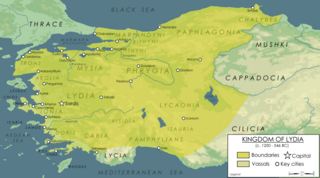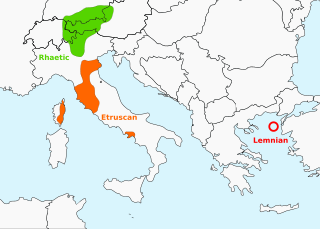
Herodotus was a Greek historian and geographer from the Greek city of Halicarnassus, part of the Persian Empire and a later citizen of Thurii in modern Calabria, Italy. He is known for having written the Histories – a detailed account of the Greco-Persian Wars. Herodotus was the first writer to perform systematic investigation of historical events. He has been described as "The Father of History", a title conferred on him by the ancient Roman orator Cicero.

Lydia was an Iron Age kingdom situated in the west of Asia Minor, in modern-day Turkey. Later, it became an important province of the Achaemenid Empire and then the Roman Empire. Its capital was Sardis.
In Greek mythology, Asia was one of the 3,000 Oceanids, daughters of the Titans Oceanus and his sister-spouse Tethys. In some accounts, her mother was called Pompholyge and sister of Libye.
Elymus was the supposed Trojan ancestor of the Elymians (Ἔλυμοι), an indigenous people of Sicily, in Greek and Roman legend.

In Greek mythology, Omphale was queen of the kingdom of Lydia in Asia Minor. Diodorus Siculus provides the first appearance of the Omphale theme in literature, though Aeschylus was aware of the episode. The Greeks did not recognize her as a goddess: the undisputed etymological connection with omphalos, the world-navel, has never been made clear. In her best-known myth, she is the mistress of the hero Heracles during a year of required servitude, a scenario that, according to some, offered writers and artists opportunities to explore sexual roles and erotic themes.
In Etruscan mythology, Tyrrhenus was one of the founders of the Etruscan League of twelve cities, along with his brother Tarchon. Herodotus describes him as the saviour of the Etruscans, because he led them from Lydia to Etruria; however this Lydian origin is to be debated as it contradicts cultural and linguistic evidence, as well as the view held by both the Etruscans themselves and by other Etrusco-Roman and Greek ancient sources. His name was given to the Etruscan people by the Greeks. The Romans extended this use to the sea west of Etruria: the Tyrrhenian Sea.

Attis was the consort of Cybele, in Phrygian and Greek mythology.

Tyrrhenians or Tyrsenians was the name used by the ancient Greeks authors to refer, in a generic sense, to non-Greek people, in particular pirates.

The Büyük Menderes River, is a river in southwestern Turkey. It rises in west central Turkey near Dinar before flowing west through the Büyük Menderes graben until reaching the Aegean Sea in the proximity of the ancient Ionian city Miletus. The river was well known for its sinuous, curving pattern, and gives its name to the common term used to describe these characteristic bends in rivers.
In Greek mythology, Callirhoe was one of the Oceanids, daughters of the Titans: Oceanus and Tethys.
In Greek mythology, Makedon, also Macedon or Makednos, was the eponymous ancestor of the ancient Macedonians according to various ancient Greek fragmentary narratives. In most versions, he appears as a native or immigrant leader from Epirus, who gave his name to Macedonia, previously called Emathia according to Strabo, which according to Marsyas of Pella was until then a part of Thrace.
Halie or Halia is the name of the following characters in Greek mythology:

Arcadia is a region in the central Peloponnese. It takes its name from the mythological character Arcas, and in Greek mythology it was the home of the gods Hermes and Pan. In European Renaissance arts, Arcadia was celebrated as an unspoiled, harmonious wilderness; as such, it was referenced in popular culture.
Lydus, a son of Atys and Callithea, grandson of Manes, and brother of Tyrrhenus or Torybus, is a legendary figure of the 2nd millennium BC who is attested by Herodotus to have been an early king of Lydia, then probably known as Maeonia. According to Herodotus, the country of Lydia and its people were afterwards named for Lydus, their mythical ancestor.
Manes is a legendary figure of the 2nd millennium BC who is attested by Herodotus in Book One of Histories to have been an early king of Lydia, then probably known as Maeonia. He was believed to have been the son of Zeus and Gaia, and was the father of Atys, who succeeded him as king. Atys, through Callithea, fathered Lydus, after whom the Lydian people were later named, and Tyrrhenus, after whom the Tyrrhenians were named. Later, in Book Four, Herodotus states that Manes had another son called Cotys, who, through Halie, had a son called Asies, after whom the Lydians claimed that the continent of Asia is named. Dionysius of Halicarnassus names Callirhoe, daughter of Oceanus, as the mother of Cotys by Manes, and Atys as the son of Cotys.
In Greek mythology, Alebion or Albion (Ἀλβίων) of Liguria, was a son of Poseidon and brother of Dercynus. In one source, Alebion was also known as Ialebion (Ἰαλεβίων).
Atys is a legendary figure of the 2nd millennium BC who is attested by Herodotus to have been an early king of Lydia, then probably known as Maeonia. He was the son of Manes and the father of Lydus, after whom the Lydian people were later named.
In Greek mythology, Pylaeus, son of Lethus, son of Teutamides, descendant of Pelasgus. He was one of the allies to King Priam in the Trojan War; he commanded the Pelasgian contingent together with his brother Hippothous. Pylaeus is hardly ever mentioned separately from his brother; they are said to have fallen in battle together by Dictys Cretensis and to have been buried "in a garden" according to the late Latin poet Ausonius.
In Greek mythology, Carteron was an Arcadian prince as one of the 50 sons of the impious King Lycaon either by the naiad Cyllene, Nonacris or by unknown woman.







